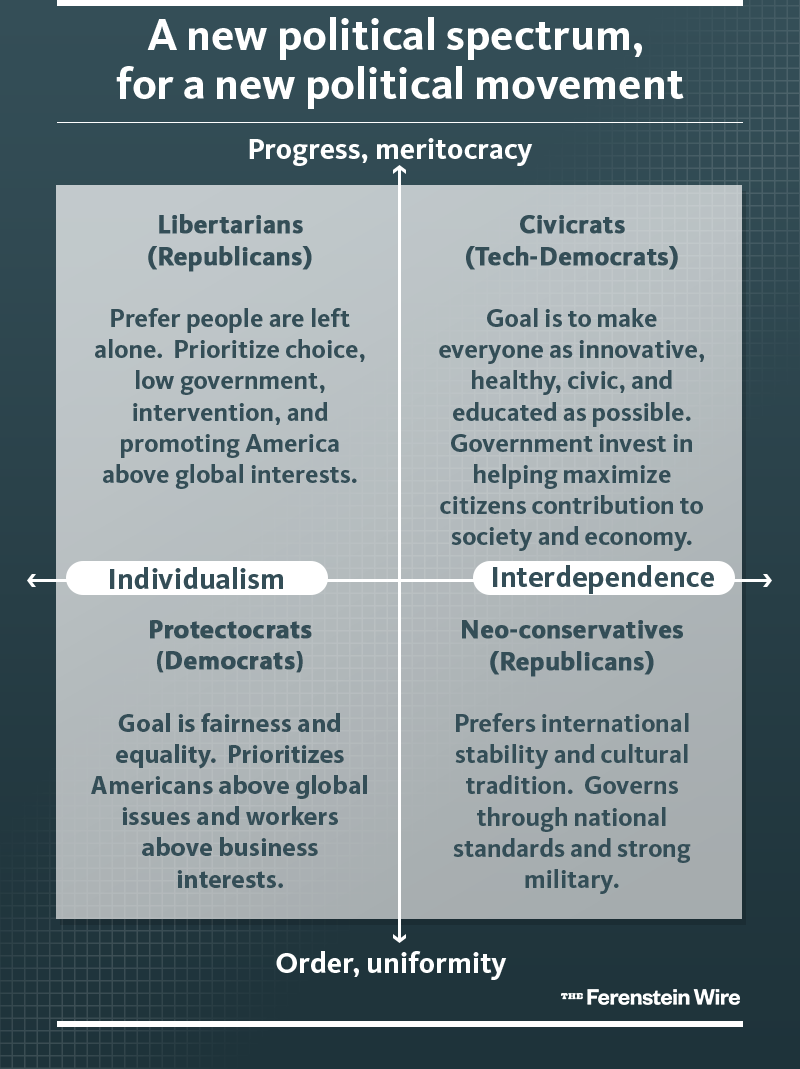More Humanist than Libertarian: The Political Ideology of Silicon Valley Technopreneurs

This past Tuesday, Silicon Valley resident, journalist, and author of Age of Optimists: A Quantitative Glimpse of How Silicon Valley Will Transform Political Power and Everyday Life (available in full here) Greg Ferenstein sat down with Darrell M. West, vice president and director of Governance Studies and founding director of the Center for Technology Innovation at Brookings Institute, to discuss the political views of technopreneurs and the tech industry labor force and how their population’s views differ from the American population as a whole. His conclusions are a result of a survey of 129 startup founders and 595 Americans (methodology and raw data here), as well as various interviews.
Ferenstein argues that Silicon Valley political ideology doesn’t fit neatly into the Republican/Democrat divide; tech founders’ support for policies is based on their optimistic and “collectivist” worldview that (1) all change is good, hence technological advancement should not be curtailed by any regulation, and (2) open information/knowledge is the cure-all solution. (Interestingly enough, this means that privacy is not as useful a concept as transparency, a split in the tech industry best demonstrated by both their patent wars and the open source movement.)
In his own words on an article for Fast Company, Silicon Valley’s idealistic philosophy behind their political leanings sounds related to, if not like, humanism:
Founders’ breed of optimism or idealism is rooted in a belief that most of humanity have the same goals—and anytime we think we’ve found a good solution toward those goals, there’s always a better solution worth exploring. Change, over the long run, is nearly always good in the mind of the typical Silicon Valley founder. To disrupt simply means to shed imperfection, exposing ever more perfect solutions beneath.
Tech founders are often misrepresented as libertarians due to their support for deregulation (especially to encourage the sharing economy in each state), open trade, and efforts that encourage free markets and capitalism including limiting power of unions (to minimize barriers to technological advancement), but they heavily identify as Democrats, appealing to younger urbanized college-educated Democrats in particular. They don’t inherently distrust larger government or social institutions—they simply believe that all designs and processes can be improved, often investing huge amounts to charter schools and education initiatives.
 Source: The Ferenstein Wire
Source: The Ferenstein Wire
Technopreneurs are also liberal leaning in their views on social justice. Ferenstein points out that Facebook, which considers itself apolitical, allowed users to rainbow-tint their profile pictures in support of same-sex marriage. Diversity and privilege are also viewed from the perspective of economics; by investing in the talent pipeline (STEM education for women, minorities, and people of color), investing in making a more inclusive hiring process, and allowing for high-skilled immigration, they are increasing their productivity through better ideas and, in the case of immigration, increasing the probability of attracting “geniuses” who can move the field forward.
Their ideal government, according to Ferenstein, would be a Star Trek-style one based on reason, logic, and exploration (according to Wikipedia founder Jimmy Wales: “I believe in the elimination of borders and free commerce as a route to peace. Barriers necessarily imply violence”), and their ideal existence would be a college-like lifestyle where each individual can explore their interests, build knowledge, and work on projects—an experience subsidized by a basic minimum income provided through a tax on consumption. In fact, a movement towards this type of experience is already mimicked in workplaces either through free time for employees’ own projects, education and training credits, self-employment, and remote/flex-work options, a type of experience that they believe facilitated their own entrepreneurship and allows citizens to create their own solutions.
However, Ferenstein believes tech advancement and information transparency would not lead to a more equal society, but a less equal one, though tech founders don’t always make the assumption that inequality is inherently bad if automatization takes care of our basic needs leaving us to focus on what we want. As he describes in his ebook:
Economically, the technology industry exacerbates inequality between the rich and middle-class, but eradicates poverty by making essential goods freely accessible. Ultimately, this will trend toward a two-class society of extremely wealthy workaholics who create technologies that allow the rest of society to enjoy leisurely prosperity. The cost for this prosperity will be inequality of influence.
Regardless of one’s attitude about their purported ideology, they do have a lot of spending power to use in influence of the government, to the degree that disagreeable policies could be “political suicide” for anyone in opposition to Silicon Valley ideas.
To hear his talk at Brookings Institute, check out the audio here.
